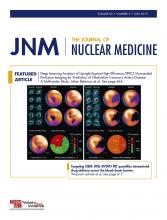Research ArticleCardiology
Deep Learning Analysis of Upright-Supine High-Efficiency SPECT Myocardial Perfusion Imaging for Prediction of Obstructive Coronary Artery Disease: A Multicenter Study
Julian Betancur, Lien-Hsin Hu, Frederic Commandeur, Tali Sharir, Andrew J. Einstein, Mathews B. Fish, Terrence D. Ruddy, Philipp A. Kaufmann, Albert J. Sinusas, Edward J. Miller, Timothy M. Bateman, Sharmila Dorbala, Marcelo Di Carli, Guido Germano, Yuka Otaki, Joanna X. Liang, Balaji K. Tamarappoo, Damini Dey, Daniel S. Berman and Piotr J. Slomka
Journal of Nuclear Medicine May 2019, 60 (5) 664-670; DOI: https://doi.org/10.2967/jnumed.118.213538
Julian Betancur
1Division of Nuclear Medicine, Department of Imaging, and Departments of Medicine and Biomedical Sciences, Cedars-Sinai Medical Center, Los Angeles, California
Lien-Hsin Hu
1Division of Nuclear Medicine, Department of Imaging, and Departments of Medicine and Biomedical Sciences, Cedars-Sinai Medical Center, Los Angeles, California
Frederic Commandeur
1Division of Nuclear Medicine, Department of Imaging, and Departments of Medicine and Biomedical Sciences, Cedars-Sinai Medical Center, Los Angeles, California
Tali Sharir
2Department of Nuclear Cardiology, Assuta Medical Centers, Tel Aviv, Israel
3Ben Gurion University of the Negev, Beer Sheba, Israel
Andrew J. Einstein
4Division of Cardiology, Department of Medicine, Columbia University Irving Medical Center and New York–Presbyterian Hospital, New York, New York
5Department of Radiology, Columbia University Irving Medical Center and New York–Presbyterian Hospital, New York, New York
Mathews B. Fish
6Oregon Heart and Vascular Institute, Sacred Heart Medical Center, Springfield, Oregon
Terrence D. Ruddy
7Division of Cardiology, University of Ottawa Heart Institute, Ottawa, Ontario, Canada
Philipp A. Kaufmann
8Department of Nuclear Medicine, Cardiac Imaging, University Hospital Zurich, Zurich, Switzerland
Albert J. Sinusas
9Section of Cardiovascular Medicine, Department of Internal Medicine, Yale University School of Medicine, New Haven, Connecticut
Edward J. Miller
9Section of Cardiovascular Medicine, Department of Internal Medicine, Yale University School of Medicine, New Haven, Connecticut
Timothy M. Bateman
10Cardiovascular Imaging Technologies LLC, Kansas City, Missouri; and
Sharmila Dorbala
11Division of Nuclear Medicine and Molecular Imaging, Department of Radiology, Brigham and Women’s Hospital, Boston, Massachusetts
Marcelo Di Carli
11Division of Nuclear Medicine and Molecular Imaging, Department of Radiology, Brigham and Women’s Hospital, Boston, Massachusetts
Guido Germano
1Division of Nuclear Medicine, Department of Imaging, and Departments of Medicine and Biomedical Sciences, Cedars-Sinai Medical Center, Los Angeles, California
Yuka Otaki
1Division of Nuclear Medicine, Department of Imaging, and Departments of Medicine and Biomedical Sciences, Cedars-Sinai Medical Center, Los Angeles, California
Joanna X. Liang
1Division of Nuclear Medicine, Department of Imaging, and Departments of Medicine and Biomedical Sciences, Cedars-Sinai Medical Center, Los Angeles, California
Balaji K. Tamarappoo
1Division of Nuclear Medicine, Department of Imaging, and Departments of Medicine and Biomedical Sciences, Cedars-Sinai Medical Center, Los Angeles, California
Damini Dey
1Division of Nuclear Medicine, Department of Imaging, and Departments of Medicine and Biomedical Sciences, Cedars-Sinai Medical Center, Los Angeles, California
Daniel S. Berman
1Division of Nuclear Medicine, Department of Imaging, and Departments of Medicine and Biomedical Sciences, Cedars-Sinai Medical Center, Los Angeles, California
Piotr J. Slomka
1Division of Nuclear Medicine, Department of Imaging, and Departments of Medicine and Biomedical Sciences, Cedars-Sinai Medical Center, Los Angeles, California

Data supplements
Supplemental Data
Files in this Data Supplement:
In this issue
Journal of Nuclear Medicine
Vol. 60, Issue 5
May 1, 2019
Deep Learning Analysis of Upright-Supine High-Efficiency SPECT Myocardial Perfusion Imaging for Prediction of Obstructive Coronary Artery Disease: A Multicenter Study
Julian Betancur, Lien-Hsin Hu, Frederic Commandeur, Tali Sharir, Andrew J. Einstein, Mathews B. Fish, Terrence D. Ruddy, Philipp A. Kaufmann, Albert J. Sinusas, Edward J. Miller, Timothy M. Bateman, Sharmila Dorbala, Marcelo Di Carli, Guido Germano, Yuka Otaki, Joanna X. Liang, Balaji K. Tamarappoo, Damini Dey, Daniel S. Berman, Piotr J. Slomka
Journal of Nuclear Medicine May 2019, 60 (5) 664-670; DOI: 10.2967/jnumed.118.213538
Deep Learning Analysis of Upright-Supine High-Efficiency SPECT Myocardial Perfusion Imaging for Prediction of Obstructive Coronary Artery Disease: A Multicenter Study
Julian Betancur, Lien-Hsin Hu, Frederic Commandeur, Tali Sharir, Andrew J. Einstein, Mathews B. Fish, Terrence D. Ruddy, Philipp A. Kaufmann, Albert J. Sinusas, Edward J. Miller, Timothy M. Bateman, Sharmila Dorbala, Marcelo Di Carli, Guido Germano, Yuka Otaki, Joanna X. Liang, Balaji K. Tamarappoo, Damini Dey, Daniel S. Berman, Piotr J. Slomka
Journal of Nuclear Medicine May 2019, 60 (5) 664-670; DOI: 10.2967/jnumed.118.213538
Jump to section
Related Articles
Cited By...
- Artificial Intelligence-Enhanced Perfusion Scoring Improves the Diagnostic Accuracy of Myocardial Perfusion Imaging
- Predicting coronary artery disease severity through genomic profiling and machine learning modelling: The GEnetic SYNTAX Score (GESS) trial
- Artificial Intelligence Predicts Hospitalization for Acute Heart Failure Exacerbation in Patients Undergoing Myocardial Perfusion Imaging
- Explainable Deep Learning Improves Physician Interpretation of Myocardial Perfusion Imaging
- Nuclear Medicine and Artificial Intelligence: Best Practices for Algorithm Development
- Quantitative clinical nuclear cardiology, part 2: Evolving/emerging applications
- Automated interpretation of the coronary angioscopy with deep convolutional neural networks
- Proposed Requirements for Cardiovascular Imaging-Related Machine Learning Evaluation (PRIME): A Checklist: Reviewed by the American College of Cardiology Healthcare Innovation Council
- The Future of Nuclear Medicine Depends on the Quality of Its Research: Researchers at the University of Heidelberg Receive the Award for Best Article of the Year
- Automated interpretation of the coronary angioscopy with deep convolutional neural networks
- Functionalized mesoporous silica nanoparticles for innovative boron-neutron capture therapy of resistant cancers
- Artificial Intelligence in Nuclear Medicine
- Intelligent Imaging: Artificial Intelligence Augmented Nuclear Medicine
- Solid-State Detector SPECT Myocardial Perfusion Imaging






